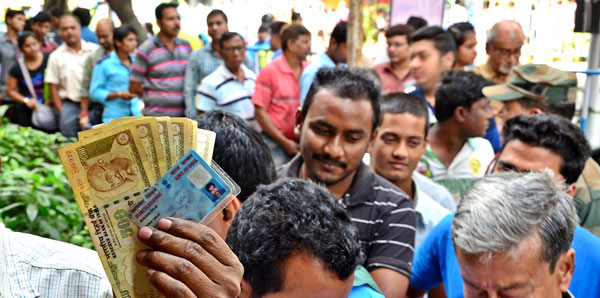
Demonetisation a Masterstroke, Give it time to play out: CII
While it is not possible to have a firm estimate of unaccounted wealth, it is widely estimated at around a fifth of India’s GDP or around $450 billion.
While some of this may be stored in cash, some may be in assets such as real estate and jewellery.
This negatively affects the business environment, especially for those who comply with the law of the land and follow ethical practices, CII has said in a press release issued here on Sunday.
“After a short period of some pain when the economy adjusts to the sudden withdrawal of cash, CII expects a much stronger economy. India’s cash-dependence is extremely high with a currency-GDP ratio of around 12 per cent compared to 4-5 per cent in other developing countries. High level of cash usage tends to slow down the flow of money through the economy. As we transition to a greater usage of fintech for payments, spending will rise leading to additional economic growth. This is an economic masterstroke by the Prime Minister and must be allowed time to play out,” said Chandrajit Banerjee, Director General, CII.
The prevalence of cash use has also made India prone to high inflation. Corruption and excessive cash use tends to erode the purchasing power of money. Lower cash use will have a dampening impact on inflation and this will be a further positive for India’s macro-fundamentals.
“The Reserve Bank will now have more room to cut interest rates as inflation subsides. Already, the bond market has reacted to the news with a reduction in the bond yields,” Banerjee observed.
The CII release further elaborated that this move will be positive for banks whose deposit mobilisation will be strengthened. The old currency notes will be deposited with banks and more households will find it imperative to open bank accounts and make use of card payments.
Currency in the form of Rs 1000 and Rs 500 notes amounted to Rs 14.2 lakh crore as of March 2016, or about 85 per cent of total currency in circulation.
If this is converted to current and savings deposits, there will be an increase in banks’ liquidity.
This is also a great opportunity to transition to a “plastic economy”, where there is a prevalence of debit and credit cards for transactions, CII said in the release.
CII has stated that in all likelihood, a fair proportion of the Rs 14 lakh crore in high-denomination currency will not return to the banking system, for fear of accounts being scrutinised.
If one assumes that about 20 per cent of the cash does not return to the system, this would amount to about Rs 3 lakh crore or $42 billion.
This is a reduction in the RBI’s liability to the public, allowing it to print a similar amount of fresh money or transfer the gain to the government.
“The biggest gain from this move will be greater formalisation of the economy. Currently, the costs of informality are evident in low tax base which impacts government revenues, lack of economic control through monetary instruments, and lower economies of scale. India’s tax base is low and its tax to GDP ratio needs to increase from the current level of 16.6 per cent, which is much lower than about 21 per cent in other emerging economies. Less than 30 million Indians filed personal income tax with more than half of these paying no tax,” said the CII Director General.
The demonetization of high denomination notes is ultimately a strong message that goes out to all those who used cash for illicit activities. A big blow has been dealt to those who engaged in corruption and took cash bribes. The message will have far-reaching implications for those who indulge in such illicit activities. This would greatly curb such transactions and will be a body blow to corruption, racketeering, human trafficking, gambling, and other such activities which vitiate the entire security system of the country, said the CII release.
For industry, this is indeed a historic and welcome move with very positive implications.
The existence of a parallel economy provides unfair competition to organised industry which pays taxes and complies with standards. Such a decisive move will change the perception of India completely and bring about much-needed transparency. It will prevent people from violating the law with impunity even for daily business transactions, CII said.
Image: Representational picture of the Indian 500 curency note which has been banned by the Indian government
Support Our Journalism
We cannot do without you.. your contribution supports unbiased journalism
IBNS is not driven by any ism- not wokeism, not racism, not skewed secularism, not hyper right-wing or left liberal ideals, nor by any hardline religious beliefs or hyper nationalism. We want to serve you good old objective news, as they are. We do not judge or preach. We let people decide for themselves. We only try to present factual and well-sourced news.







